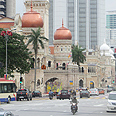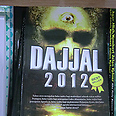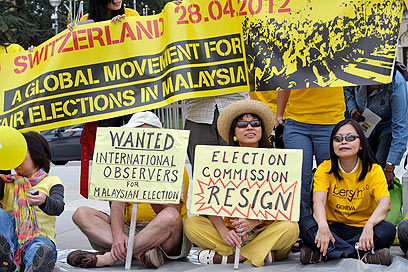



MALAYSIA – "The world is in complete disarray. Evil spreads across Arab countries like dark clouds. A man who awakes a believer might lose his faith at nighttime. People trade their religion for a tiny portion of earthly goods. Whoever remains faithful will resemble a man holding blazing cinders. The temple will be the reason for the destruction of a country. The rebuilding of Temple will be accompanied by the destruction of a country and a horrible battle."
Numerous texts circulate in the Muslim world, prophesying the ominous emergence of Dajjal, a false prophet considered to be "the Jewish King," whose coming will incite Armageddon. Dozens if not hundreds of millions of Muslims around the world are extremely concerned with the impending coming of said king.
Related stories:
- Malaysia opposition leader backs Israel's security
- Malaysia arrests blogger over Mohammad tweets
- Malaysia opposition claims Israeli spies in police
The text continues: "The occupation of Constantinople will be accompanied by the appearance of the king of Jews – Dajjal. Yes, the Jews are waiting impatiently for the arrival of their beloved king. And he shall appear; he shall conquer the earth, from east to west. He shall command all creatures to worship him. He will emerge from the valley between Syria and Iraq, and spread disarray and mayhem all over. His desire is to lead humanity down the path of utter disbelief or the assuming of some false religion. Many will follow him, saying that he provides them with food. He will instill in them a false hope of his ability to restore the world's balance."
Dajjal signifies the ultimate evil under Islamic belief. The meaning of the name in Arabic is "deceiving" – a false messiah. Muslim traditions depict him in various manners: Some argue he would emerge as a man blind in one eye; others see him as a monstrous creature, whose head is above the clouds and his feet are in the bottom of the ocean.
Regardless, the fate of the Jewish King is determined. He is to rule the earth a mere 40 days until Allah's true messenger will defeat and destroy him and all his followers, leaving only Muslims to walk the earth.
I was not aware of the intensity of this apocalyptic prophecy until I stumbled upon the overwhelming abundance of Dajjal-related literature in book shops and booths across Malaysia. From the capital's Islamic museum's gift-shop to improvised paraphernalia market booths, books focusing on the false-prophesying Jewish King are sold alongside decorative Quran books, prayer mats and DVDs featuring local preachers.

Apocalyptic recounts of Dajjal (Photos: Eldad Beck)
Islamic apocalyptic literature thrives in Malaysia, as in the rest of the Muslim world. Clerics and self-ordained experts offer contemporary interpretations to the figure of Dajjal and his imminent emergence. Many argue that his coming is correlated with conflicts in the Middle East: Prediction of a nuclear war between Iran and Israel; Jewish domination of the Temple Mount and the expulsion of Al-Aqsa Mosque and the Dome of the Rock; revolution in the Arab world; the suffering of Muslims by the hands of Christians and Jews. On top of everything, recent natural disasters – from massive earthquakes to floods in Southeast Asia – are perceived as omens for nearing fulfillment of the apocalyptic prophecy.
According to Islamic oral tradition, upon Dajjal's arrival, an army of 70,000 Jews from Iran's Ispahan will follow him. The uncompromising prophecy ignores the fact that Iran currently boasts only 20,000 Jews. Nevertheless, according to Muslim scholars, Dajjal is undoubtedly Jewish, or as they put it, "The son of a Jewish mother." Some even argue that he was already born and is residing in the Jewish State.
Jews and other minorities
In Malaysia, one of the strongest economies in Southeast Asia, with a population of some 30 million people, there has never been a large Jewish community. Following the British Empire's mid-19th century conquest of the emirates that would later create the Federation of Malaya, a few merchant families from Iraq, India, China and Europe have settled in the multicultural port-cities Melaka and George Town.
During WWII, most of Malaysia's Jewish population fled to Singapore, in fear of the Japanese invasion. Nearly all Jews that returned after the war left the country again in the 1970s, due to a bloody civil war and ensuing islamization-related anti-Semitism.
The synagogue at the constituent island of Penang was officially closed in 1976, for lack of worshipers, and what was once known as the "street of the Jews" is now the residence of the ruling Islamic party's offices.

Hardly any Jews left. The Penang Jewish cemetery
Though many in the world perceive Malaysia as a successful example of a country that manages to integrate Islamic law with democratic values, the country's Muslim majority – though it comprises only a little over 50% of the population – seems to exercise hostility toward many of the country's minorities, which could perhaps account for the fact that even though there are hardly any Jews in the country, it is nonetheless infected with anti-Semitism.
"Wherever you look, you'll see how the government… exercises a divide and conquer policy so as to stop the key minorities – Chinese, Indian, Christians, atheists, Buddhists and Pagans – from uniting," said a Malaysian opposition activist, who spoke anonymously.
"A little over 40 years ago, the 'democratic' Malaysia declared a state of emergency, by which the government was empowered to detain any person indefinitely without trial," he said.
"This country has no democracy. You can't express your opinion freely. The government controls the media. You can't believe a word of what is being printed in the papers. Instead of creating a shared national identity, they're creating cultural ghettos for the minorities, and offer benefits to everyone willing to convert to Islam – from governmental assistance to jobs.
"This religious apartheid," the activist continued," is seen at its worst in east Malaysia… where a large population of pagans reside. We know of many cases in which medical students were sent to eastern regions to perform surgeries on non-Muslims… when in fact the students were conducting medical experiments on those people, experiments that would often result in death."
The ubiquity of anti-Jewish perceptions in Islamic culture is therefore linked to a political atmosphere of general xenophobia and an absence of an actual Jewish community to humanize the demonic misconceptions. All that, coupled with a political instability when it comes to ties with the Jewish State, raises many questions in regards to the democratic future of Malaysia, in the face of potential radicalization, as well as to its cultural and diplomatic ties with Israel.
Political turmoil
Opposition leader Anwar Ibrahim, 64, a former minister and deputy prime minister said in a January interview with the Wall Street Journal: "I support all efforts to protect the security of the state of Israel."As a result, Malaysian government officials accused Ibrahim for essentially acknowledging the State of Israel, in contradiction with the declared policy of his country. Protests were organized against him, claiming that he was "pro-Israel."
Ibrahim was forced to issue an official statement declaring that his words were taken out of context and that he in fact expressed his support of a two-state solution that would ensure both that the rights of Palestinians were defended and that Israel's defense was secured.
In May 2010, however, Ibrahim spoke against Jews, up to a point that B'nai B'rith International, a prominent Jewish human rights organization, condemned him, claiming that he was a "purveyor of anti-Jewish hatred."
Ibrahim's branding as a "political chameleon" by his own country is indicative of the country's fluctuation.

Malaysians protest for fair elections (Photo: EPA)
Furthermore, though the Malaysian government vowed that it would not construct any diplomatic ties with Israel, Former Prime Minister Mahathir Mohamad is known to have maintained amicable ties with Israeli prime ministers – in the 1990s, as peace negotiations with Palestinians were at their peak, Mahathir was corresponding with Israeli prime ministers Benjamin Netanyahu, Ehud Barak and Yizthak Rabin, in a letter to whom he added in his own handwriting: "I wish for normal ties with Israel."

Anti-Israel protest after 2010 Gaza flotilla (Photo: Reuters)
A US senior official who was involved with efforts to promote Israeli-Malaysian ties told Ynet that the "Local regimes repeatedly reject our efforts to promote (diplomatic ties with Israel) and claim that they're afraid of the reactions of fundamentalist Islamists."
A Westerner familiar with Malaysian history argued that "part of the Malaysian Muslims' sympathy with Palestinians stems from the fact that most Muslims in the country are the descendants of the region's indigenous people. The rest of the ethnic minorities – Chinese, Indians and others – were brought in by the British colonization systems in order to develop Malaysia's economy. The latter started to accumulate assets, funds and statuses that the Muslims feel were taken away from them.
"Ever since the independence, and especially under the rule of Mahathir, there was an effort to strengthen the economic, political and public status of Muslims. From the 1970s onwards, a clear process of Islamic radicalization has been consequently underway, and the Palestinian issue and subsequent anti-Semitic atmosphere have been a dominant part in that radicalization," the source noted.
According to the estimates of the anonymous opposition activist, "If political upheaval indeed occurs, it will only be in the direction of further radicalization, seeing as radical Islamists are part of the opposition. The Islamists are perceived as 'clean' politicians in the face of a corrupt government. They will also get many votes of Chinese and Indian voters.
"So many people around me are willing to go the extra mile to finally bring down the ruling party, but they're not really taking into account the meaning that their votes will have on their futures," the activist concluded.
- Receive Ynetnews updates
directly to your desktop















